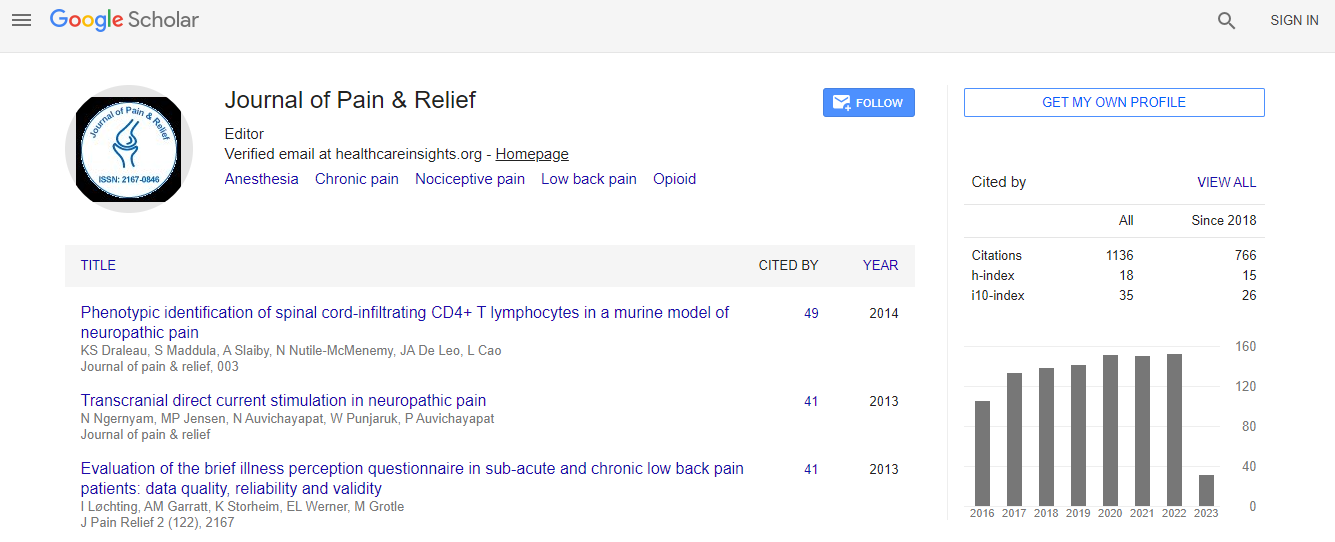Our Group organises 3000+ Global Conferenceseries Events every year across USA, Europe & Asia with support from 1000 more scientific Societies and Publishes 700+ Open Access Journals which contains over 50000 eminent personalities, reputed scientists as editorial board members.
Open Access Journals gaining more Readers and Citations
700 Journals and 15,000,000 Readers Each Journal is getting 25,000+ Readers
Recommended Conferences
42nd Global Conference on Nursing Care & Patient Safety
Toronto, CanadaGoogle Scholar citation report
Citations : 1556
Journal of Pain & Relief received 1556 citations as per Google Scholar report
Journal of Pain & Relief peer review process verified at publons
Indexed In
- Index Copernicus
- Google Scholar
- Open J Gate
- Genamics JournalSeek
- Cosmos IF
- RefSeek
- Hamdard University
- EBSCO A-Z
- OCLC- WorldCat
- Publons
- Geneva Foundation for Medical Education and Research
- Euro Pub
- ICMJE
Useful Links
Recommended Journals
Related Subjects
Share This Page
Assessment of analgesic activity of Nelumbo nucifera fruit
7th International Conference and Exhibition on Pain Research and Management
Muhammad Ali Rajput
Multan Medical and Dental College, Pakistan
ScientificTracks Abstracts: J Pain Relief
Abstract
Recently use of herbal therapies and diet rich in flavonoids and vitamins has increased considerably to treat minor to modest inflammatory disorders, thus existing study was focused to evaluate the analgesic effect of Nelumbo nucifera fruit in order to justify its traditional use Pharmacologically in disorders which are associated with pain and inflammation e.g. cancer and arthritis. In current study central analgesic activity in mice was assessed by tail flick test and tail flick latency difference (TFLD) i.e. the time in seconds taken by mouse to remove its tail clearly out of water was noted as the reaction time, Similarly acetic acid induced writhing test was also conducted for the assessment of systemic analgesic effect in mice and number of writhes were counted along with percent inhibition of writhes. Both tests were conducted utilizing separate set of 49 white albino mice of either sex weighing 20-25 g and were equally placed in seven groups. In tail flick test the peek anti-nociceptive effect at all doses of fruit was observed at 90 minutes, however the percentage of tail elongation time was highest at a dose of 200 mg/kg i.e. 82% at 90 minutes. Number of writhes was highly significantly reduced at all doses of N. nucifera fruit but maximum effects were observed at dose 200 mg/kg as compared to control (indicating 48.41 % inhibition of writhes). N. nucifera fruit have exhibited strong analgesic effect in both animal models which was highly comparable with aspirin and that may be connected with the inhibition of arachidonic acid metabolism hence justified its traditional use in disorders associated with pain and thus encourage more preclinical and clinical trials in this field. Recent Publications 1. Assad T, Khan R A and Rajput M A (2018) Anticonvulsant effect of Trigonella foenum graecum L on strychnine induced epilepsy model. Journal of Nutritional Health & Food Science 6(1):1-6. 2. Assad T, Khan R A and Rajput M A (2017) Anti-epileptic activity of Nelumbo nucifera fruit. Metabolic Brain Disease 32:1883-1887. 3. Assad T, Khan R A and Rajput M A (2017) Evaluation of the anti-hyperlipidemic activity of Nelumbo nucifera fruit in rabbits fed with high cholesterol diet. Pharmacology & Pharmacy 8(6):205-13. 4. Khan R A and Rajput M A (2017) Phytochemical screening, acute toxicity, anxiolytic and antidepressant activities of Nelumbo nucifera fruit. Metabolic Brain Disease 32:743-749. 5. Khan R A, Feroz Z and Rajput M A (2015) Evaluation of anxiolytic activity of extract of Trachyspermum ammi. L. International Journal of Pharmacy and Pharmaceutical Sciences 7:69-71.Biography
Muhammad Ali Rajput is a young researcher and Medical Doctor from Pakistan who has attained PhD and MPhil degrees in Pharmacology from University of Karachi, Karachi and MBBS degree from Liaquat University of Medical & Health Sciences Jamshoro, Pakistan. He attended course of Professional Competency Enhancement Program for Teachers (PCEPT) in May 2009 and became certified academician of Higher Education Commission (HEC), Pakistan. He is well oriented with scientific writing and has so far published 9 articles in journals of international repute and many are under peer review process. He has a teaching experience of more than10 years and currently serving in Multan Medical & Dental College as Assistant Professor in the Department of Pharmacology. He is well acquainted and expert in conducting teaching sessions based on either conventional or integrated methods of learning and have conducted MBBS, BDS, DPT and BS nursing classes.
E-mail: drmuhammadali2016@gmail.com

 Spanish
Spanish  Chinese
Chinese  Russian
Russian  German
German  French
French  Japanese
Japanese  Portuguese
Portuguese  Hindi
Hindi 
